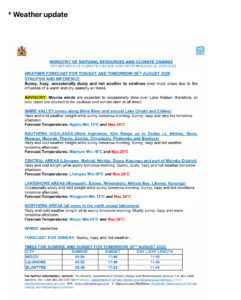
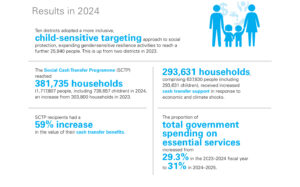
* Government spending on essential services increased in 2023 to 2024, from 29.3%-31%;
* On health, including WASH, from 10%-12.6% and social protectionfrom 3%-3.7%
* Education was the only social sector in which government support did not increase, by decreasing from 15.7%-14.8%
* Malawi’s macro-fiscal challenges – including unsustainable debt, foreign exchange shortages and inflation – threatened social sector investments
By Duncan Mlanjira
United Nations Children’s Fund (UNICEF)-Malawi applauds the Malawi Government as its strategic development partner — alongside other stakeholder donors in the country — for the critical role they played in achieving significant results and progress for children in Malawi in 2024; that included government increasing social sector support budgets during the period.

Advertisement
In its report on the situation of children in Malawi-2024, published on the UNICEF Malawi website, UNICEF-Malawi country office indicates that Government spending on essential services increased in 2023 to 2024, from 29.3%-31% and on from 10%-12.6% on health, including water sanitation and hygiene (WASH).
Social protection was also increased from 3%-3.7% while education was the only social sector in which government support did not increase — decreasing from 15.7%-14.8%.
UNICEF acknowledges that “Malawi’s macro-fiscal challenges – including unsustainable debt, foreign exchange shortages and inflation – threatened social sector investments”.
“Consequently, UNICEF advocated for protecting social sector spending and mobilizing resources. Strategic partnerships with the government and civil society organisations (CSOs) drove reforms and secured funding for inclusive social protection systems.”

The UN agency takes cognizance that government’s evaluations of programmes like the social cash transfer programme (SCTP) led to improved designs and expanded coverage — following the 2023–2024 El Niño-induced drought that left over 5.7 million people in Malawi facing acute food insecurity and in need of humanitarian assistance.
Thus through the SCTP, over 2.5 million people were reached with integrated life-saving services — including 1.9 million children below the age of 5 years; 66,054 primary-school-aged children; 67,000 adolescents; 3,500 expectant mothers and breastfeeding women and 80,000 caregivers of children aged 0–23 months.
“The adverse conditions [of El Niño-induced drought] widened existing nutrition gaps and disproportionately affected individuals with chronic illnesses such as HIV and tuberculosis, whose dietary needs were often unmet.
“The effects of El Niño underscored the urgent need to integrate climate resilience into Malawi’s development agenda and UNICEF continued its key role in inter-agency emergency preparedness and response coordination.

Advertisement
In 2024, it led efforts in WASH, nutrition, child protection and education clusters — while also supporting risk communication and community engagement as part of the health cluster.
In the same period, UNICEF reports that shortly after the Government established the National Children’s Commission (NCC) and submitted its report to the Committee on the Rights of the Child, the agency operationalised its Secretariat having played a crucial role in the establishment of the NCC.
UNICEF supported the NCC’s structure, contributed to the development of its annual work plan, and raised awareness nationwide about the commission and its work — and continued to advocate for increased and sustained government investment in adolescent health, as well as maternal and newborn health services.
“These efforts were driven through strategic, high-level engagements, including direct dialogue with the Minister of Health and active participation in key multi-stakeholder platforms convened by the Ministry.”
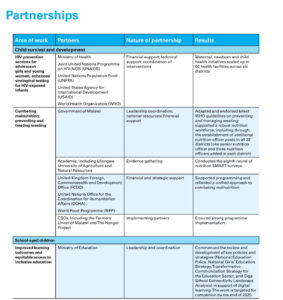
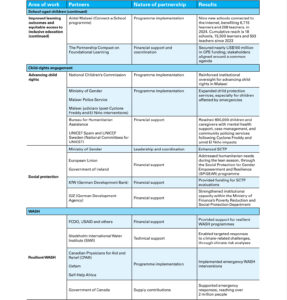
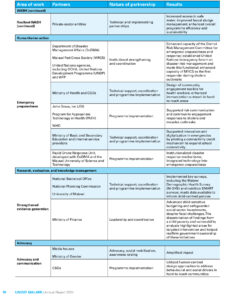
When launching the Malawi Congress Party (MCP) manifesto for the September 16 general election, President Lazarus Chakwera pledged that once given the mandate for a second terms, his administration shall introduce future bank accounts for every newborn child, where the government will deposit K500,000 accessible when they turn 18-years — a measure aimed at ending generational poverty.
“This is how we build a Malawi where poverty is not inherited,” declared Chakwera at the launch in July held at Bingu International Convention Centre in Lilongwe. “This new five-pillar manifesto aims to transform Malawi by 2030, beginning with eradicating hunger through comprehensive agricultural reforms that will ensure sustainable food security for every citizen.”
In 2020 fresh presidential election under Tonse Alliance, Chakwera and his former running mate, late Saulos Chilima, promised to deliver 1 million jobs for the youth and that has now been revised in the 2025 manifesto to 3 million as Chakwera appealed to Malawians to grant him a fresh five-year mandate to complete development projects disrupted by crises during his first term.

Chakwera unveiling the MCP manifesto in July
The President highlighted that some initiatives that were pledged to be developed ahead of the 2020 fresh elections — including the 1 million jobs — stalled due to global and domestic challenges, but he emphasised that progress had still been made in critical areas like infrastructure, health, and housing.
“Despite the storms we’ve faced, including CoVID-19, global economic shocks, Cyclone Ana & Freddy, cholera outbreak — and the Chikangawa tragedy that claimed the life of Vice-President Saulos Klaus Chilima, we have laid a solid foundation. With your trust, we will finish the job,” said Chakwera.
The MCP manifesto centres on food security, governance reform, improved public service delivery, wealth building and job creation at three million, particularly targeting the youth — whom Chakwera described as “the engine of national progress”.


Advertisement
On his campaign trail, Chakwera pledges to govern with transparency, vision, and results if re-elected, adding that the five core pillars in the manifesto — food security; job & wealth creation; governance; reform; and rebooting the public service delivery strategic pillars.
These are designed to drive the realisation of the MW2063 national vision; the long-term national development strategy aimed at transforming Malawi into a wealthy and self-reliant nation.
